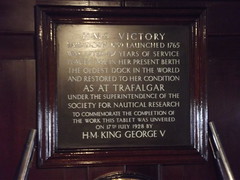HMS Victory
Commemorated on 1 plaque
H.M.S. Victory laid down 1759 launched 1765 was after 157 years of service placed 1922 in her present berth the oldest dock in the world and restored to her condition as at Trafalgar under the superintendence of the Society for Nautical Research to commemorate the completion of the work this tablet was unveiled on 17th July 1928 by H.M. King George V
Lower Gun Deck, HMS Victory, Portsmouth, United Kingdom where it placed in her present berth the oldest dock in the world (1922)

